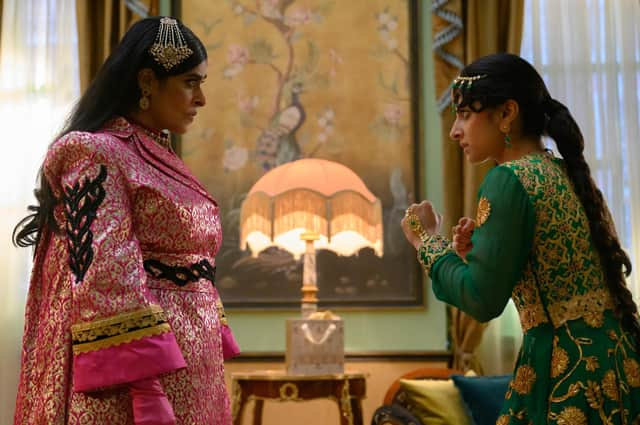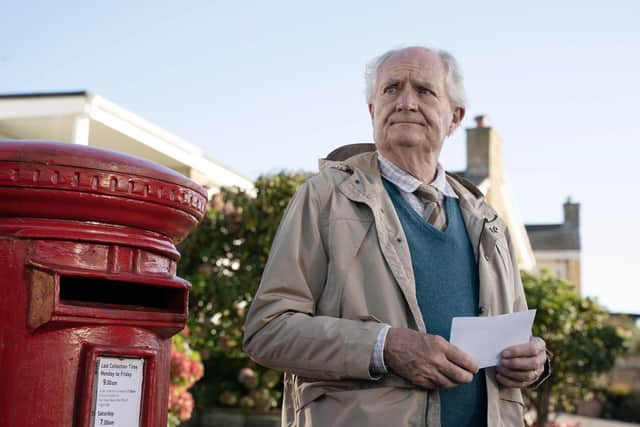Film reviews: Polite Society | The Unlikely Pilgrimage of Harold Fry


Polite Society (12A) ***
The Unlikely Pilgrimage of Harold Fry (12A) **
A martial arts-fuelled coming-of-age comedy about a British Pakistani teenager trying to save her sister from her impending nuptials, writer/director Nida Manzoor’s debut film Polite Society operates in the same overstuffed genre-mash-up register as much of Edgar Wright’s output. A little bit Jane Austen, a little bit Bollywood, a little bit Ocean’s Eleven and a little bit St Trinian’s, it also cribs some of the video game aesthetics of Wright’s own Scott Pilgrim vs the World, and pays extensive (albeit it blood-free) tribute to the kung fu fury of the Kill Bill movies, Crouching Tiger, Hidden Dragon and The Matrix franchise. And that’s before we even get to the mid-point twist, which plays like a light-hearted riff on Jordan Peele’s Get Out, while also spoofing older classics like Invasion of the Body Snatchers and The Stepford Wives. If the resulting film is a somewhat lumpy concoction, held together by scrappy charm, sugary sentimentality and soupçon of Cliff Notes-style genre deconstruction, in its best moments it also feels like an admirable attempt by Manzoor (who broke through with the hit Channel 4 sitcom We Are Lady Parts) to sincerely reflect the heightened, sometimes senseless sensibilities of its 16-year-old protagonist.
This is Ria Khan (Priya Kansara), a mildly rebellious rich kid with her own martial arts YouTube channel. Ria dreams of becoming a stuntwoman, much to the chagrin of her well-meaning mum and dad (Shobu Kapoor and Jeff Mirza), who want her to put her expensive private school education to use pursuing a more respectable career. They’ve already let one daughter, Ria’s elder sister Lena (Ritu Arya), attend art school and Lena’s subsequent decision to drop out and move back home in a funk is all the proof they need that parents know best. Opening the film by cross-cutting between the impetuous Ria and the defeated Lena, Manzoor quickly establishes the extent to which these sisters remain each other’s biggest cheerleaders. Whether defending each other’s lifestyle choices during comically fraught family dinners or jointly telling their mum off as she casually body shames her own friend’s daughter, the bonds of sisterhood help shield them against the unintentionally devastating glare of parental disappointment. So when Lena suddenly succumbs to the charms of Salim (Akshay Khanna), the handsome geneticist son of their mother’s wealthy friend Raheela (Nimra Bucha), Ria smells a rat and embarks on a mission to prevent her sister from, as she sees it, ruining her life.
Advertisement
Hide AdIt’s a fun set-up and Manzoor gets a lot of mileage out of using the excesses of the action genre to reflect the intensity of Ria’s emotions, as she struggles to cope with the fact that her sister’s priorities in life might simply be changing. But the action is also very consequence free; there’s no delineation between what’s fantasy and what’s not, so when the stakes are theoretically raised by Ria as she uncovers some genuinely insidious intent behind the creepily overbearing Raheela’s determination to marry off her only son to Lena, nothing ever feels genuinely at stake. As a result, the action – as entertaining as it sometimes is – eventually becomes repetitive until the plot kind of fizzles out with a self-aware discussion about how the plot kind of fizzles out.
Still, at least Manzoor acknowledges her influences, which is more than can be said for the makers of The Unlikely Pilgrimage of Harold Fry, a tonally odd redemption story about a pensioner who embarks on spontaneous pilgrimage on foot to visit a dying friend hundreds of miles away in an effort to save her life. Based on screenwriter Rachel Joyce’s own Booker longlisted novel of the same name, the details of the premise are so strikingly similar to a real life pilgrimage filmmaker Werner Herzog made in the winter of 1974 (he walked from Munich to Paris to visit an ailing friend, a journey he later documented in his diary/travelogue Of Walking in Ice) that it’s both weird that it’s never alluded to and disappointing that such an intriguing act of secular faith seems to have been a jumping off point for such a mundane story.
Director Hettie MacDonald (TV’s Normal People) presents the journey of her film’s titular protagonist (played by Jim Broadbent) in more biblical terms, with crepuscular light frequently illuminating Harold’s path to redemption as he embarks on a 500-mile plus journey to visit his estranged friend Queenie (Linda Basset). A lifetime of regret has turned Harold into an emotional zombie and the film scratches at something interesting as the act of slowly shuffling along Britain’s backroads gradually brings him back to life, even as his body starts deteriorating under the strain.


But his journey is also frequently interrupted by thinly conceived well-wishers and followers who seem desperate to turn him into a kind of geriatric Jesus, searching for salvation of their own, or perhaps just basking in the attendant media glare (the film doesn’t seem too interested in exploring either). Indeed, these later stages often make the film seem like a Proclaimers song away from becoming a chirpy Brit-com, which also detracts from the most dramatically compelling aspect of film: Harold’s faltering marriage to Maureen (Penelope Wilton), whom he abandons without warning as he takes off on his self-styled pilgrimage, but whose deep-rooted pain the terrific Wilton essays in the scenes of her sitting around their suddenly empty house, ruminating on her already lonely life with renewed anger.
Both films are on general release from 28 April